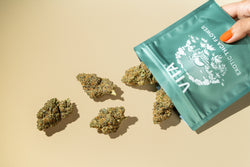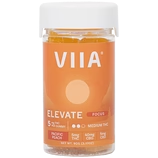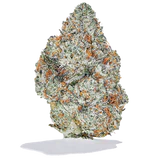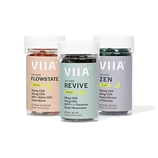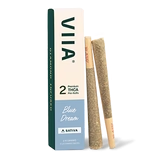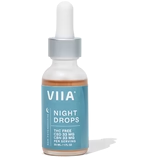 thca
thcaWhat is THCA Flower?
THCA flower refers to cannabis flower or buds that are high in tetrahydrocannabinolic acid (THCA) and low in Delta-9 tetrahydrocannabinol (THC). This unique composition is achieved through selective genetics, specialized cultivation, and precise post-harvest handling.
Unlike traditional cannabis that has been dried and cured—causing THCA to convert into THC—raw THCA flower retains its natural chemical profile. This distinction matters: under the 2018 Farm Bill, hemp is legally defined as containing less than 0.3% THC by dry weight. So even though THCA flower can deliver powerful effects when heated, it’s still federally legal as long as it meets this threshold.
At VIIA, we specialize in premium-grade THCA flower grown indoors under optimal conditions for potency, purity, and terpene expression. Whether you’re new to cannabis or an experienced user, our curated strains are designed to elevate your experience—legally and reliably.

Why THCA Doesn’t Get You High (Until It Does)
Have you ever wondered why chewing on raw cannabis doesn’t get you high, but smoking or baking it does? The answer lies in decarboxylation.
THCA is the non-psychoactive precursor to THC. It only becomes psychoactive when exposed to heat. That means if you’re using raw THCA flower (say, in a smoothie or salad), you’re consuming a non-intoxicating cannabinoid with promising wellness potential. But light it up or bake it into brownies, and you activate THC—ushering in the familiar effects of euphoria, relaxation, and heightened sensory perception.

This property makes THCA flower an intriguing option for individuals seeking to explore the full benefits of the cannabis plant without experiencing its psychoactive effects. It is particularly beneficial for those who may not have access to legal recreational cannabis in their area but still wish to benefit from the plant's therapeutic properties.
In this blog, we’ll discuss some key information on consuming THCA products and the expected effects.
How To Use THCA Flower
THCA needs to be heated to transform into THC. This can happen through:
-
Smoking: Roll it, pack it, or load it into your favorite piece or water pipe. Heat instantly converts THCA into THC, making for a fast-acting experience.
-
Vaping: Vaporizers heat the flower without combustion, offering smoother, more terpene-rich hits.
-
Cooking / Edibles: Bake at low heat to activate the THC, then infuse into butter or oil for use in your favorite recipes. Be sure to strain to avoid excess plant material.
- Raw Consumption: Prefer a non-psychoactive route? Raw THCA flower can be added to juices or smoothies. While it won’t get you high, it may offer other potential benefits related to inflammation, nausea, or neuroprotection according to early research.
What Does THCA Flower Feel Like?
What THCA feels like will depend on how you’ve prepared it.
You won’t get high consuming THCA flower in its raw form, which means its effects will feel much more subtle. Many people use THCA flower as a superfood to enhance their diet, for example, like taking a multivitamin — but you won’t feel anything. Still, with long-term use, you’ll help to support your body’s natural processes that feed into your overall well-being.
At VIIA, our THCA strains are categorized to help you match the desired effect—whether you’re looking for energy, relief, sleep, or euphoria.

When you use decarboxylated THCA (expose it to heat), you’re essentially consuming Delta-9 THC in lower concentrations, which is the main psychoactive component of the cannabis plant. Some of the effects of THC include:
- Altered sense of perception
- Elevated mood
- Comfort
- Deep relaxation
- Increased appetite
The intensity of these effects will vary depending on how you consume the heated THCA, the dose, and your individual tolerance levels to THC.
Start Small and Controlled
If you’re new to the psychoactive effects of cannabis, it’s recommended you start with lower doses and build your way up to avoid experiencing the negative effects associated with THC, such as:
- Racing thoughts and paranoia
- Cognitive impairment
- Increased heart rate
- Coordination impairment
- Dizziness
- Dry mouth
- Dry, red eyes
Popular THCA Flower Strains

Cannabis strains are the different varieties of the cannabis plant based on their growing characteristics, flavor, aroma, and effects. Strains are typically categorized into three main types: Sativa, Indica, and hybrid.
You’ll find many creative names for cannabis strains, often reflecting the genetics of the plant, flavor, appearance, or the effects it produces. Some of the most popular THCA flower strains include:
Strawberry Cough
Strawberry Cough is a Sativa-dominant hybrid cannabis strain best known for its uplifting and energetic effects, perfect for social settings. Its terpene flavors are fresh and berry-like, earthy, a touch peppery, and with skunky undertones.
Wedding Cake
Wedding Cake is another hybrid that’s more Indica-dominant and is derived from two popular strains: Cherry Pie and Girl Scout Cookies. This THCA bud strain, best known for its relaxing yet euphoric effects, has a sweet and earthy aroma with notes of vanilla and a hint of spice.
While most people like using it to unwind after a long day, some people find a burst in productivity and creative thinking, making it a go-to for personal creative projects.
Northern Lights
Northern Lights is a classic Indica strain that has been around for decades. It’s made by cross-breeding Afghani and Thai for its feel-good, deeply relaxing high. The scent notes are pungent with a spicy and citrusy top note. This strain is popular for sleep support and addressing discomfort.
Lemon Cherry Gelato
Lemon Cherry Gelato is a hybrid strain with a dessert-like flavor and a hint of grassy undertones in its densely packed conical buds. It's recommended for tough days because it offers a feel-good high that’s mellow, centering, and not too overpowering.
Purple Sticky Punch
Purple Sticky Punch is known for its characteristic purple coloring. This Indica-heavy THCA flower strain has a notably sweet flavor and potent, relaxing effects, perfect for nighttime use.
What Makes THCA Flower Different from Weed?

THCA flower and weed (marijuana) are both cannabis sativa plants but have differences in their chemical composition (cannabinoids), which determines their legal status.
THCA flower contains higher levels of THCA, which is a non-psychoactive precursor of THC. It’s typically harvested much fresher and doesn’t undergo fermentation or curing as with weed buds, which accentuates its natural terpene flavors.
Under the 2018 Farm Bill, THCA flower can be legally sold as long as the THC content is below 0.3%, classifying it as hemp flower.
The Research Behind THCA
Let’s take a moment to analyze THCA itself as a cannabinoid and its potential benefits when consumed in its raw form.
Most of the research behind cannabis revolves around the two main cannabinoids, THC and CBD, so we’ll try to explain THCA in relation to THC.
Looking at its chemical structure, THCA has an extra carboxyl group (COOH), making the shape slightly different from THC.
Think about cannabinoids as keys and receptors as locks. The THC molecule is the perfect shape for activating the psychoactive effects that come from unlocking the CB1 receptor, whereas THCA has a different role.
THCA doesn’t have an affinity to the CB1 receptor, which is why you won’t get high from eating raw THCA flower. Instead, it’s found to have a mild interaction with CB2 receptors, which are involved in immune response and inflammation regulation [3].
There’s also additional research to suggest that THCA may have neuroprotective qualities, which is important for maintaining brain health with age [4]. However, most of the research on THCA on brain health is very early studies and requires time and more research funding.
And similar to THC, research has observed THCA’s anti-nausea effects but without the high in murine models, highlighting it as a potential cannabinoid for those who want this relief but without the high that can be distracting for daily activities [5].
We want to underscore that by no means are we suggesting that THCA flower or other cannabis products should be used to self-treat any condition. The FDA has not approved THCA for use to treat or mitigate any condition. So if you have a health concern, we strongly recommend you speak with your healthcare professional.
What Makes VIIA’s THCA Flower Different?
At VIIA, we believe in simplifying the cannabis experience while maximizing quality. Our THCA flower is:
- Indoor grown for consistency, purity, and top-tier trichome development
- Lab tested by third-party facilities for potency and safety
- High in terpenes for bold flavor and better effects
- Carefully packaged to preserve freshness and cannabinoid content
- Crafted with intention—we don’t just grow, we curate
Whether you’re here for the potential benefits of raw cannabinoids or seeking a powerful legal high, our lineup is backed by years of cannabis innovation and customer trust.
Will THCA Show Up On A Drug Test?
Yes. Even raw THCA can trigger a positive result on drug tests that check for THC metabolites. If you’re concerned about testing, we recommend avoiding THCA products altogether or consulting with your employer.
Final Thoughts
THCA flower offers a unique, federally legal pathway to enjoying cannabis effects—without the red tape. Whether consumed raw or heated, it brings flexibility, potential wellness benefits, and a smoother experience than conventional weed for many users.
When you choose VIIA, you’re choosing transparency, potency, and consistency. We’ve spent years refining our cultivation process to ensure you receive flower that’s clean, compliant, and curated with care.
👉 Ready to try THCA flower the VIIA way?
Shop our curated indoor-grown strains today and elevate your experience—naturally.
Resources:
- Vigil, J. M., Stith, S. S., Diviant, J. P., Brockelman, F., Keeling, K., & Hall, B. (2018). Effectiveness of raw, natural medical cannabis flower for treating insomnia under naturalistic conditions. Medicines, 5(3), 75.
- Kim, J., Choi, P., Park, Y. T., Kim, T., Ham, J., & Kim, J. C. (2023). The cannabinoids, CBDA and THCA, rescue memory deficits and reduce amyloid-beta and tau pathology in an Alzheimer’s disease-like mouse model. International journal of molecular sciences, 24(7), 6827.
- Nallathambi, R., Mazuz, M., Ion, A., Selvaraj, G., Weininger, S., Fridlender, M., ... & Koltai, H. (2017). Anti-inflammatory activity in colon models is derived from δ9-tetrahydrocannabinolic acid that interacts with additional compounds in cannabis extracts. Cannabis and cannabinoid research, 2(1), 167-182.
- Nadal, X., Del Río, C., Casano, S., Palomares, B., Ferreiro‐Vera, C., Navarrete, C., ... & Muñoz, E. (2017). Tetrahydrocannabinolic acid is a potent PPARγ agonist with neuroprotective activity. British journal of pharmacology, 174(23), 4263-4276.
- Rock, E. M., Kopstick, R. L., Limebeer, C. L., & Parker, L. A. (2013). Tetrahydrocannabinolic acid reduces nausea‐induced conditioned gaping in rats and vomiting in S uncus murinus. British journal of pharmacology, 170(3), 641-648.

